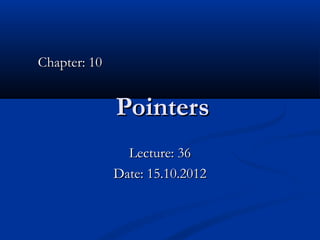
Lec 36 - pointers
- 1. Chapter: 10 Pointers Lecture: 36 Date: 15.10.2012
- 2. What are Pointers Used For? Accessing array elements Passing arguments to a function when the function needs to modify the original argument Passing arrays and strings to functions Obtaining memory from the system Creating data structures such as linked lists
- 3. Memory and Addresses 1270 1271 1272 1273 1274 1275 Computer Memory
- 4. Memory and Addresses Addresses Locations 1270 1271 1272 1273 1274 1275 Computer Memory
- 5. Memory and Addresses int IntVar1; //2 bytes int IntVar2; //2 byte
- 6. Memory and Addresses Addresses Locations 1270 1271 int IntVar1; //2 bytes 1272 IntVar1 int IntVar2; //2 byte 1273 1274 1275 IntVar2 Computer Memory
- 7. Memory and Addresses int IntVar1 = 25; int IntVar2 = 11;
- 8. Memory and Addresses Addresses Locations 1270 1271 int IntVar1 = 25; 25 IntVar1 1272 int IntVar2 = 11; 1273 1274 11 IntVar2 1275 Contents/Data
- 10. Memory and Addresses In some cases we may be interested in knowing the address where our variable is being stored during runtime. The address that locates a variable within memory is what we call a reference to that variable. e.g., & IntVar; Address-of/reference When preceding the name of the variable “IntVar” with the operator reference operator (&) we are no longer talking about the content of the variable itself, but about its reference (i.e., its address in memory).
- 11. Memory and Addresses #include <iostream> #include <conio.h> using namespace std; int main() { int IntVar1; int IntVar2; cout << &IntVar1 << endl //print the addresses << &IntVar2 << endl; getch(); return 0; }
- 12. Pointer Variable The variable that stores the reference to another variable is what we call a pointer. e.g., ptr &InVar;
- 13. Pointer Variable The variable that stores the reference to another variable is what we call a pointer. e.g., Pointer-to Pointer/Pointer-variable int * ptr; //variable “ptr” as a pointer-to “int” ptr &InVar;
- 14. Accessing Addresses int main() { int IntVar1 = 25; int IntVar2 = 11; int* ptr; //pointer to integers ptr = &IntVar1; //pointer points to IntVar1 cout << ptr << endl //print the address of IntVar1 ptr = &IntVar2 cout << ptr << endl //print the address of IntVar2 getch(); return 0; }
- 15. int* ptr; 1270 ptr = &IntVar1; ptr 1271 cout << ptr ; 1271 25 IntVar1 1272 ptr points-to to the 1273 address of IntVar1 1274 11 1275 IntVar2 1270 1271 25 1272 IntVar1 int* ptr; ptr 1273 ptr = &IntVar2; 1274 1274 cout << ptr ; 11 ptr points-to to the 1275 IntVar2 address of IntVar2
- 16. Accessing Contens int main() { int IntVar1 = 25; int IntVar2 = 11; int* ptr; //pointer to integers ptr = &IntVar1; //pointer points to IntVar1 cout << *ptr << endl //print the content of IntVar1 ptr = &IntVar2 cout << *ptr << endl //print the content of IntVar2 getch(); return 0; }
- 17. ptr int* ptr; ptr = &IntVar1; 25 IntVar1 *ptr is 25 cout << *ptr ; 11 deference /indirection operator. IntVar2 Expression *ptr means the value of the variable pointed to by ptr. 25 IntVar1 ptr int* ptr; ptr = &IntVar2; 11 *ptr is 11 IntVar2 cout << *ptr ;
- 18. Pointer to Void The address that is put in a pointer variable must be the same type as the pointer, for example, the address of a float variable can’t be assigned to a pointer to int. float floVar = 25.67; int* ptrInt = &floVar;
- 19. Pointer to Void The address that is put in a pointer variable must be the same type as the pointer, for example, the address of a float variable can’t be assigned to a pointer to int. float floVar = 25.67; int* ptrInt = &floVar; //ERROR: can’t assign float* to int*
- 20. Pointer to Void The address that is put in a pointer variable must be the same type as the pointer, for example, the address of a float variable can’t be assigned to a pointer to int. float floVar = 25.67; int* ptrInt; ptrInt = &floVar; //ERROR: can’t assign float* to int* Exception to that case is a general-purpose pointer that can point to any data type, e.g., void* ptrVoid; //pointer to void
- 21. Pointer to Void The address that is put in a pointer variable must be the same type as the pointer, for example, the address of a float variable can’t be assigned to a pointer to int. float floVar = 25.67; int* ptrInt; ptrInt = &floVar; //ERROR: can’t assign float* to int* Exception to that case is a general-purpose pointer that can point to any data type, e.g., void* ptrVoid; //pointer to void ptrVoid = &floVar; //OK
- 22. Counting by Integers - Arrays
Notas del editor
- Student Book
- Student Book
- Student Book
